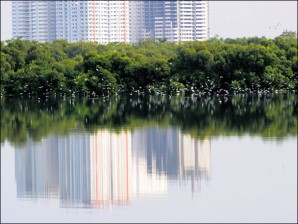
IN DANGER Birds feed at the Las Piñas-Parañaque Coastal Lagoon in Manila Bay. A reclamation project threatens to destroy the nature reserve and bird sanctuary. AFP FILE PHOTO
MANILA, Philippines—A company planning to reclaim a 149-hectare portion of Manila Bay to build a site for offices, factories and residential areas on Saturday sought to assure residents of coastal areas of Manila Bay, including those in Cavite and Laguna, that the project would have no adverse effects on their communities.
In a statement, Manila Goldcoast Development Corp. (MGDC) said residents of communities surrounding Manila Bay in the two provinces have no reason to fear the reclamation project, as it would bring no harm to their livelihood, mainly fishing, or their communities’ ecology.
“We have engaged the best people and the best institutions to undertake the crucial stage in planning out the proposed reclamation and, as a responsible business organization, we are fully committed to complying with all laws, rules and regulations that will eradicate or minimize any negative impact that this project may have on the ecology of Manila Bay,” said MGDC in the statement.
“Beyond this, our plan will integrate the latest technologies in renewable energy, as well as water recycling, wastewater treatment and waste-to-energy facilities,” it added.
Environmentalists and fishermen’s groups have raised concern over the planned reclamation project, saying it could impact negatively on fishing grounds and marine environments in Manila Bay.
MGDC said the proposed site of its planned project does not sit on any fishing ground or environmentally sensitive area.
The company also said the project will not, in any way, aggravate flooding in Metro Manila or any coastal areas in Manila Bay.
Citing a La Liga Policy Institute study, MGDC said one major cause of flooding in Metro Manila and its suburbs is the denudation of the Marikina watershed. Of the 33,000-hectare Marikina watershed, only 22 percent remains covered with trees and vegetation, it said.
The proposed reclamation project, it said, has the support of almost all officials of the Manila city government, including its mayor, vice mayor and councilors. It said the project has the potential of creating up to 100,000 jobs in six years.